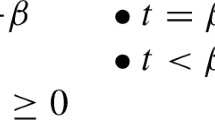Abstract
This essay attempts to implement epistemic logic through a non-classical inference relation. Given that relation, an account of '(the individual) a knows that A' is constructed as an unfamiliar non-normal modal logic. One advantage to this approach is a new analysis of the skeptical argument.
Similar content being viewed by others
References
Dretske, F., ‘Epistemic operators’, Journal of Philosophy (1970), 1-22.
Hintikka, J. K., Knowledge and Belief, Cornell University Press, Ithica, 1962.
Kleene, S. C., Introduction to Metamathematics, Van Nostrand, Princeton, 1952.
Kripke, S., ‘Semantical analysis of modal logic II. Non-normal modal propositional calculi’, in J. W. Addison, L. Henkin, and A. Tarski (eds.), The Theory of Models, North-Holland, Amsterdam, pages 206-220, 1965.
Schotch, P. K., and R. E. Jennings, ‘Epistemic logic, skepticism and non-normal modal logic’, Philosophical Studies 40 (1981), 47-67.
Thomason, S. K., ‘Possible worlds and many truth values’, Studia Logica XXXVII,2 (1977), 195-204.
Author information
Authors and Affiliations
Rights and permissions
About this article
Cite this article
Schotch, P.K. Skepticism and Epistemic Logic. Studia Logica 66, 187–198 (2000). https://doi.org/10.1023/A:1026713415568
Issue Date:
DOI: https://doi.org/10.1023/A:1026713415568



